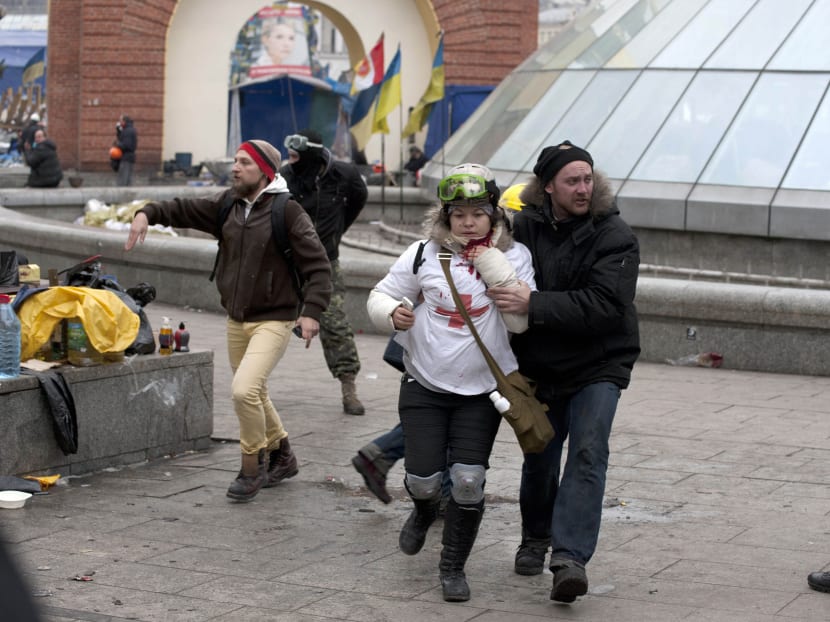Ukraine protest bloodbath: Yanukovich accused
KIEV — Ukraine’s interim authorities yesterday (April 3) accused fugitive President Viktor Yanukovich of ordering snipers to open fire on protesters and getting help from Russian security agents to battle his own people, but they provided no evidence directly linking him to the bloodbath in Kiev that left more than 100 people dead.

Olesya Zhukovska (left) is helped after being shot in her neck by a sniper bullet, in Independence Square, the epicenter of the country's current unrest, Kiev, Ukraine. Photo: AP
KIEV — Ukraine’s interim authorities yesterday (April 3) accused fugitive President Viktor Yanukovich of ordering snipers to open fire on protesters and getting help from Russian security agents to battle his own people, but they provided no evidence directly linking him to the bloodbath in Kiev that left more than 100 people dead.
Acting Interior Minister Arsen Avakov also accused his predecessor, who was in charge of police, of recruiting gangs of killers, kidnappers and thugs to terrorise and undermine the opposition during the month-long protests.
The inquiry revealed by Kiev’s new leadership examined the months of anti-government protests that culminated in the bloodshed that peaked on Feb 20, just days before Mr Yanukovich fled to Russia.
Speaking at a televised news conference, Mr Avakov said police snipers shot at demonstrators near Kiev’s Independence Square, also known as the Maidan, as they walked toward the government district. He said 17 people were killed by snipers positioned at the October Palace cultural centre and that one sniper alone killed as many as eight people.
Security officials then moved to cover up and destroy evidence “to ensure that any investigations would be impossible”, Mr Avakov said. “Clothes were burned, weapons discarded and documents destroyed.”
Ukrainian Security Service chief Valentyn Nalyvaichenko charged that Mr Yanukovich himself ordered the killings.
“What was planned under the guise of an anti-terrorist operation, and which was in fact an operation of mass killing of people, took place under the immediate and direct leadership of former president Yanukovich,” Mr Nalyvaichenko said. He did not elaborate on where he got his information.
In an interview Wednesday with The Associated Press, Mr Yanukovich firmly denied that he gave orders to shoot demonstrators, saying that members of his inner circle even criticised him for his reluctance to use force during the month-long protests.
Mr Nalyvaichenko also said there was evidence that Russia’s FSB security service, the successor agency to the KGB, assisted in attempts to suppress the anti-government protests. He said FSB members were deployed at a Ukrainian security facility — 26 in December and six in January — and that they took part in planning and implementing anti-protest measures. He said the Russians even interrogated the Ukrainian security chief.
Mr Nalyvaichenko contended that in late January, when peaceful protests turned into bloody street clashes with police, Russia sent planes to Kiev carrying explosives, arms and crowd control devices “to organise executions and the extermination of our protesters on the Maidan”.
Russia’s FSB swiftly dismissed the claims, telling the state news agency RIA Novosti yesterday that the allegations should “rest on the conscience of the Ukrainian Security Service”.
Prosecutor General Oleh Makhnitsky said 12 members of an elite riot police unit called “Black Squadron” have already been detained on suspicion of shooting protesters.
The identity of the snipers believed to be responsible for most of the deaths is the subject of bitter disagreement.
Opponents of Ukraine’s new leadership deny that only police were to blame, contending some snipers were organised by opposition leaders trying to whip up outrage.
The new health minister, Mr Oleh Musiy, who previously served as the protesters’ top medic, has said he treated both protesters and riot police with similar types of sniper wounds.
Yesterday, officials skirted a question on whether snipers also shot at police. Mr Avakov said establishing who was responsible for the deaths of law enforcement officers would be part of the broad investigation that is still ongoing.
Mr Avakov also detailed what he described as overwhelming evidence linking former Interior Minister Vitali Zakharchenko, who was in charge of police during the protests, to a person coordinating hired thugs who beat and intimidated opposition activists.
Mr Avakov said another underworld figure operating under the patronage of Mr Yanukovich and Mr Zakharchenko ran a group of 10 people carrying out beatings and kidnapping of protest organisers, including the kidnapping of a prominent activist and his colleague, who was killed in the attack.
In the weeks since the February killings, Russia seized and then formally annexed Crimea, Ukraine’s strategic Black Sea peninsula, and the US and the European Union slapped sanctions on those responsible, mainly Russian President Vladimir Putin’s inner circle. On Wednesday, President Barack Obama signed into law a bill providing US$1 billion (S$1.27 billion) in loan guarantees to Ukraine.
In his interview with the AP, Yanukovich said he was wrong to invite Russian troops into Crimea, which was swiftly annexed by Moscow following a referendum in which the vast majority of residents backed a reunion with Russia. AP






